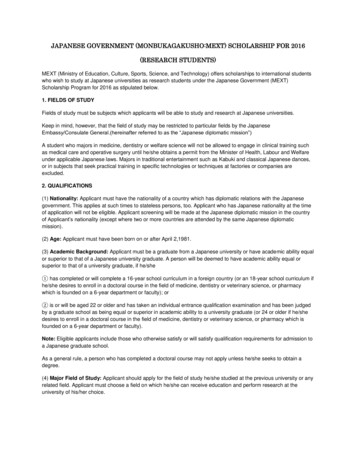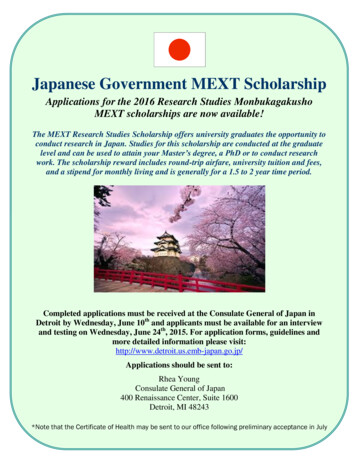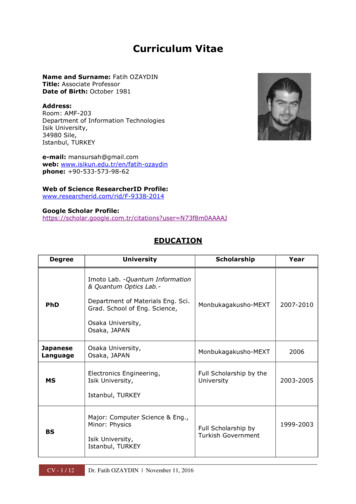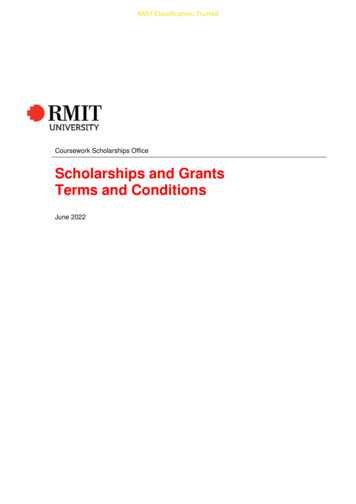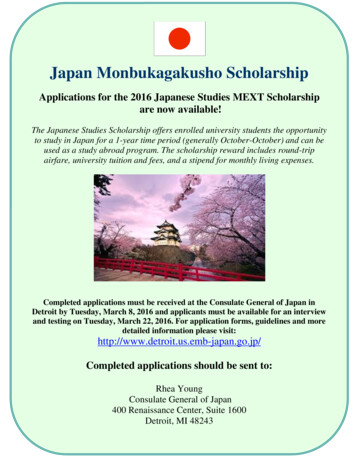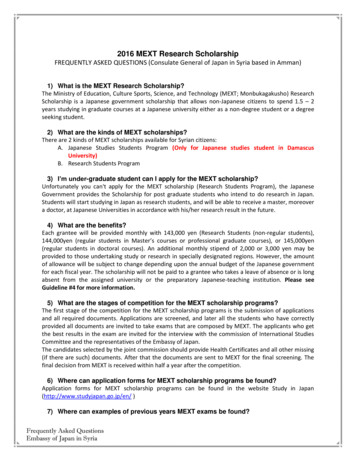
Transcription
2016 MEXT Research ScholarshipFREQUENTLY ASKED QUESTIONS (Consulate General of Japan in Syria based in Amman)1) What is the MEXT Research Scholarship?The Ministry of Education, Culture Sports, Science, and Technology (MEXT; Monbukagakusho) ResearchScholarship is a Japanese government scholarship that allows non‐Japanese citizens to spend 1.5 – 2years studying in graduate courses at a Japanese university either as a non‐degree student or a degreeseeking student.2) What are the kinds of MEXT scholarships?There are 2 kinds of MEXT scholarships available for Syrian citizens:A. Japanese Studies Students Program (Only for Japanese studies student in DamascusUniversity)B. Research Students Program3) I’m under-graduate student can I apply for the MEXT scholarship?Unfortunately you can't apply for the MEXT scholarship (Research Students Program), the JapaneseGovernment provides the Scholarship for post graduate students who intend to do research in Japan.Students will start studying in Japan as research students, and will be able to receive a master, moreovera doctor, at Japanese Universities in accordance with his/her research result in the future.4) What are the benefits?Each grantee will be provided monthly with 143,000 yen (Research Students (non-regular students),144,000yen (regular students in Master’s courses or professional graduate courses), or 145,000yen(regular students in doctoral courses). An additional monthly stipend of 2,000 or 3,000 yen may beprovided to those undertaking study or research in specially designated regions. However, the amountof allowance will be subject to change depending upon the annual budget of the Japanese governmentfor each fiscal year. The scholarship will not be paid to a grantee who takes a leave of absence or is longabsent from the assigned university or the preparatory Japanese-teaching institution. Please seeGuideline #4 for more information.5) What are the stages of competition for the MEXT scholarship programs?The first stage of the competition for the MEXT scholarship programs is the submission of applicationsand all required documents. Applications are screened, and later all the students who have correctlyprovided all documents are invited to take exams that are composed by MEXT. The applicants who getthe best results in the exam are invited for the interview with the commission of International StudiesCommittee and the representatives of the Embassy of Japan.The candidates selected by the joint commission should provide Health Certificates and all other missing(if there are such) documents. After that the documents are sent to MEXT for the final screening. Thefinal decision from MEXT is received within half a year after the competition.6) Where can application forms for MEXT scholarship programs be found?Application forms for MEXT scholarship programs can be found in the website Study in Japan(http://www.studyjapan.go.jp/en/ )7) Where can examples of previous years MEXT exams be found?Frequently Asked QuestionsEmbassy of Japan in Syria
Examples of MEXT exams from previous years can be found in the website Study in Japan(http://www.studyjapan.go.jp/en/)8) Can results of TOEFL, IELTS or other English language exam certificatesrecognized internationally be provided to prove applicant’s English language level?Applying for any MEXT scholarship program, English language exam composed by MEXT is obligatory.TOFEL, IELTS or other English language exams are not considered, therefore those documents need notbe provided9) What fields of study are acceptable for the MEXT Research Scholarship?Applicants should apply for the field of study they majored in at university or its related field. And fieldsof study must be subjects which applicants will be able to study and research in graduate courses atJapanese universities. The fields of study may be restricted to particular fields by the JapaneseEmbassy/Consulate General (hereinafter referred to as the “Japanese diplomatic mission”).A student who majors in medicine, dentistry or welfare science will not be allowed to engage in clinicaltraining such as medical care and operative surgery until he/she obtains a permit from the Minister ofHealth, Labor and Welfare under applicable Japanese laws. Majors in traditional entertainment such asKabuki and classical Japanese dances, or in subjects that seek practical training in specific technologiesor techniques at factories or companies are excluded. Please see Guideline #1 for more information.10) How do I apply?All applicants should send their complete papers by DHL or Aramex or any other shipping company toeither the Embassy of Japan in Turkey or Egypt or Lebanon or Saudi Arabia or the temporary office ofthe Embassy of Japan in Syria at Amman.11) Should the documents translated into English language be validated by the notary?Such documents as school graduation certificate, diploma or other similar certificates SHOULD BEtranslated into English and validated by the notary. If there is no possibility to get other documents inEnglish language (signed and stamped), they should also be translated into English and validated by thenotary. Health Certificate should be filled in English.12) Should an applicant submit Health Certificate together with all the documents?Health Certificate should NOT necessarily be submitted together with all the documents. After thescreening process, the Health Certificate must be submitted only by those applicants whose documentsare sent to MEXT in Japan, for the final screening13) Who is eligible to apply?To apply through the Japanese diplomatic mission, applicants must:a) Syrian Nationals including Palestinian-Syrianb) Holders of Bachelor degree with a minimum average point on 70% (including graduates ofacademic year 2015/2016)c) Under the age of 35 (born after April 2nd, 1982)d) Fluent in English or in JapanesePlease see Guideline #2 for more information.14) I live abroad. Can I apply for the MEXT Scholarship?You can apply for the MEXT Scholarship from abroad by sending you papers by (DHL or Aramex or anyother shipping company) to the temporary office of Consulate General of Japan in Syria at Amman,Frequently Asked QuestionsEmbassy of Japan in Syria
Building No.7, Between 5th & 6th Circles, Fa’eq Halazon Street, Zahran, Abdun Shamali, P. O. Box 2835,Amman 11181, Jordan. However, if selected for an interview, you MUST return to Jordan for theinterview and exams at the Consulate General of Japan on the designated day. Interviews must be donein person. We cannot do telephone/online interviews. Absolutely no exceptions will be made. Prioritywill be given to applicants who are not long term residents of Japan.15) I am Syrian citizen/ not resident in Syria Can I still apply?You can still apply for the MEXT Scholarship, but you will need to do so through the Japanese diplomaticmission responsible for your country/area (The available countries are: Lebanon, Turkey, Saudi Arabiaand Egypt) if you don’t live in one of the listed countries please apply to the temporary office of theEmbassy of Japan in Syria based in Amman. To find info about the Japanese Diplomatic missionEmbassy/Consulate General/Consulate Office, please see this link:http://www.mofa.go.jp/about/emb cons/mofaserv.html16) Can I apply online due to the circumstances of the civil war in Syria?Unfortunately we don't accept online submission for the time being, only by post.Please follow the instruction in the link below to find all the information:http://www.sy.emb-japan.go.jp/itpr en/mext research2015.html17) Can I submit only copies not original for the request document for the scholarshipdue to the circumstances of the civil war in Syria?Unfortunately all documents should be original, no exception will be made.Please follow the instruction in the link below to find all the information:http://www.sy.emb-japan.go.jp/itpr en/mext research2015.html18) When and where do MEXT exams and interviews take place?Regarding the time and place of MEXT exams and interviews, all the applicants are informed by phoneor e-mail personally, thus please provide CORRECT contact information in the application.19) For Research Studies, how can I choose which university to apply to in Japan?Ask your professors if they can suggest universities to apply to in Japan. If your professor or pastprofessors are not able to assist you in deciding where to go, you may go to the Japan Student ServicesOrganization (JASSO) website (www.jasso.go.jp) where they have a search engine of all the universitiesin Japan. The search engine can help you find a university which offers the program of study you wish topursue.20) Do I need to have admission in the three universities which I will select for the firststage?Students who pass the Primary screening can only be allowed to contact the Universities in Japan. Soyou are just required to fill in the form, NOT to contact the Universities in Japan at the applicationstage.21) When does the academic year begin and end in universities in Japan?The academic year in universities in Japan begins in April and ends in March of the following year. Inmost cases, the year is divided into two semesters, the first lasting from April to September and thesecond from October to March.Frequently Asked QuestionsEmbassy of Japan in Syria
22) What is the application timeline?Please refer to the Process and 80317.pdf)23) The Application asks for a copy of my senior thesis; however I did not write a seniorthesis. What should I do?We are aware that many college students do not write a senior thesis. Instead, we ask that you submit acopy of a major paper or project you have completed that relates to your intended field of study inJapan.24) Do I need to have majored in the Field of Study I intend to pursue in Japan?Applicants should apply for the field of study they majored in at their university, or a related field. Yourfield of study must be a subject which you will be able to study, and take graduate‐level courses in, at aJapanese university.25) How detailed should I make my Field of Study and Research Program Plan?The Research Program Plan should be something you would feel comfortable submitting as a ResearchProposal to a graduate school in the Syria. While we understand research focuses may change, youshould give us a specific account of your intended research topic, methodology, and how your researchfits into current research being done in the field. You must also tell us why this research must be done ata Japanese university.26) Can the MEXT Research Scholarship lead to a degree?Applicants can choose to apply for either (a) a non‐degree Research term (b) a Master’s degree (c) a PhDor (d) a professional degree such as a JD or MBA. Please note that applicants who apply for a degreeprogram may need to take an additional entrance exam by their desired university/faculty at their ownexpense. Alternatively, applicants can apply for the non‐degree Research term and then, while at theuniversity in Japan, apply for a Master’s, doctoral or professional degree program at that university. Ifaccepted into a degree program, the MEXT Scholarship will then extend to cover the degree program.27) What is the difference between an Embassy Recommendation and a UniversityRecommendation?University Recommendations for the MEXT Scholarship are when a university in Japan recommends astudent for the scholarship. This is a separate application and acceptance track from theEmbassy/Consulate recommendations. You will need to directly contact a university in Japan to inquireabout university recommendations.28) What is the recommendation by the Embassy of Japan to get MEXT scholarship andhow to receive that recommendation by the Embassy of Japan?The recommendation by the Embassy of Japan is one of the ways to receive Japanese MEXT governmentscholarship. In order to get the recommendation by the Embassy of Japan a person must participate inthe MEXT competition announced by the Embassy of Japan. Competition consists of the application todesired type of scholarship which meets the qualifications of the applicant, examination composed byMEXT, and participation in the interview. The best applicants are recommended to the MEXT by theEmbassy of Japan.IMPORTANT: the final screening and decision regarding scholarship are made by MEXT.Frequently Asked QuestionsEmbassy of Japan in Syria
29) Is there minimum average point?Yes there is, Holders of Bachelor degree with a minimum average point on 70% (including graduates ofacademic year 2015/2016). For more information regarding the GPA scale please review the belowtable:Quality of PerformanceLetter GradeGrade pointPercentageExcellentExcellentVery GoodVery GoodVery GoodGoodGoodGoodSatisfactorySatisfactoryFailureAAB BBC CCD DF4.03.73.33.02.72.32.01.71.31.00.094 – 100%90 – 93%87 – 89%83 – 86%80 – 83 %77 – 79%73 – 76%70 – 72%67 – 69%60 – 66%0 – 59%30) Do I have to provide both recommendation letters from previous academic teacherin Syria and from my current work manager?If possible, yes. If not please provide us with only a recommendation letter from your current workmanager.31) Where can I find information about universities/professors in Japan?You can begin by searching or browsing the Research Map of Japan (http://researchmap.jp/search/)which lists researchers in Japan by name, field, university, and location. You can also look at the Programfor Leading Graduate Schools l; in Japanese), whichlists programs endorsed by the Japan Society for the Promotion of Science (it also promotes humanitiesand social science programs).32) What exams must be taken for the Research Scholarship?Please refer to the Process and 80317.pdf)And please see Guideline #5.2 for more information.33) Do I need to know Japanese to get the scholarship?Applicants must be fluent in English or in Japanese. If you wouldn’t know Japanese at the applicationstage, you are kindly advised to start learning Japanese after you will be a successful student of the finalexam.34) Do all Scholarship recipients take the 6‐month intensive Japanese language courseupon arrival in Japan?Your university in Japan will decide whether or not they want you to take the Japanese language coursebefore beginning your research term.Frequently Asked QuestionsEmbassy of Japan in Syria
35) Can I bring my family with me?Yes, Research Scholarship recipients may bring their families with them. However, most universities willbe unable to provide or arrange housing for families, so you will need to find housing on your own.Additionally, we strongly encourage you to have your family join you a month or so after your ownarrival so you can have housing and other arrangements settled by the time they arrive. Kindly note thatany special allowance for family members will not be provided.36) Can I have my application materials returned to me?Unfortunately, NO. Once application materials have been submitted to us at the Japanese diplomaticmission, they cannot be returned under any circumstances. We encourage you to make copies of allyour application materials.37) Do medicine students in dentistry or welfare science have to obtain a permit fromthe Minister of Health, Labor and Welfare under applicable Japanese laws duringthe application stage to engage in clinical training such as medical care andoperative surgery?Applicant doesn’t need such permission at the application stage, orientation will be held after visitingJapan.38) How many copies of the application materials do I need to submit?Please see Guideline #7 for more information about the required materials and how many originals vs.copies we require of each document. Please refer to the check sheet on our Web page. Successfulapplicants will possibly be required to submit additional documents.**If you have further questions, please contact MEXT Scholarship Coordinator Ms. Sarah Al Ramly atTel: 962-6-593-2005, E-mail: studyinjapan@dm.mofa.go.jpFrequently Asked QuestionsEmbassy of Japan in Syria
2016 MEXT Research Scholarship . Science, and Technology (MEXT; Monbukagakusho) Research Scholarship is a Japanese government scholarship that allows non‐Japanese citizens to spend 1.5 - 2 years studying in graduate courses at a Japanese university either as a non‐degree student or a degree
